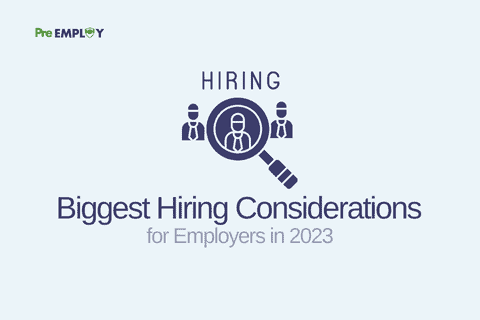Biggest Hiring Considerations for CA Employers in 2023

December 5, 2022
With the new year approaching, many new laws will soon affect California employers. These new employment laws will significantly affect the hiring process. As such, compliance will be a key concern for employers in 2023. Here are the four most significant developments facing California employers in 2023.
New Pay Transparency Laws
Beginning January 1, 2023, SB 1162 will require employers of 15 or more to provide a pay scale for positions with any job posting. In addition, SB 1162 amends California’s Labor Code section 432.3 to require these employers to provide the pay scale for any position within job postings. The law defines pay scales as the salary or hourly wage range the employer reasonably expects to pay for the work.
All employers must provide current employees with the pay scale for their position upon request. In addition, they must maintain records of job titles and wage history for each employee for specific timeframes. For employers of 100 or more employees, the law also expands the current requirements for pay data reports to incorporate additional data.
New Employment Protections for Cannabis Users
In September, Governor Gavin Newsom Signed AB 2188 into law, introducing extensive employment protections for cannabis users. Under AB 2188, employers cannot discriminate against applicants or current employees based on off-duty cannabis usage. This protection extends to any discrimination in hiring, termination, and any term or condition of employment.
Employers may continue to prohibit employees from working under the influence and using or possessing cannabis on the job. However, employers cannot rely on traditional testing methods that rely on detecting “non psychoactive cannabis metabolites.”
Fortunately, employers will have time to prepare their policies and procedures for these changes, as AB 2188 will only go into effect starting January 1, 2024. However, given these changes’ significance, it would be best to get started sooner rather than later.
Background Check Struggles Are Likely to Continue
In late September, Governor Gavin Newsome Vetoed SB 1162, which would have guaranteed public access to personal identifiers. As a result, running background checks on individuals residing in the state remains challenging and, in some cases, impossible. For now, everyone awaits the Senate’s consideration of the veto.
As a result, background check slowdowns will likely continue in 2023. Furthermore, other changes, including expanded criminal record sealings, mean employers should review their hiring policies. By working with a trusted employment screening provider, employers can consider their options and how to proceed in light of these changes.
Pre-employ makes background checks easy and reliable. Speak with a compliance expert today.
